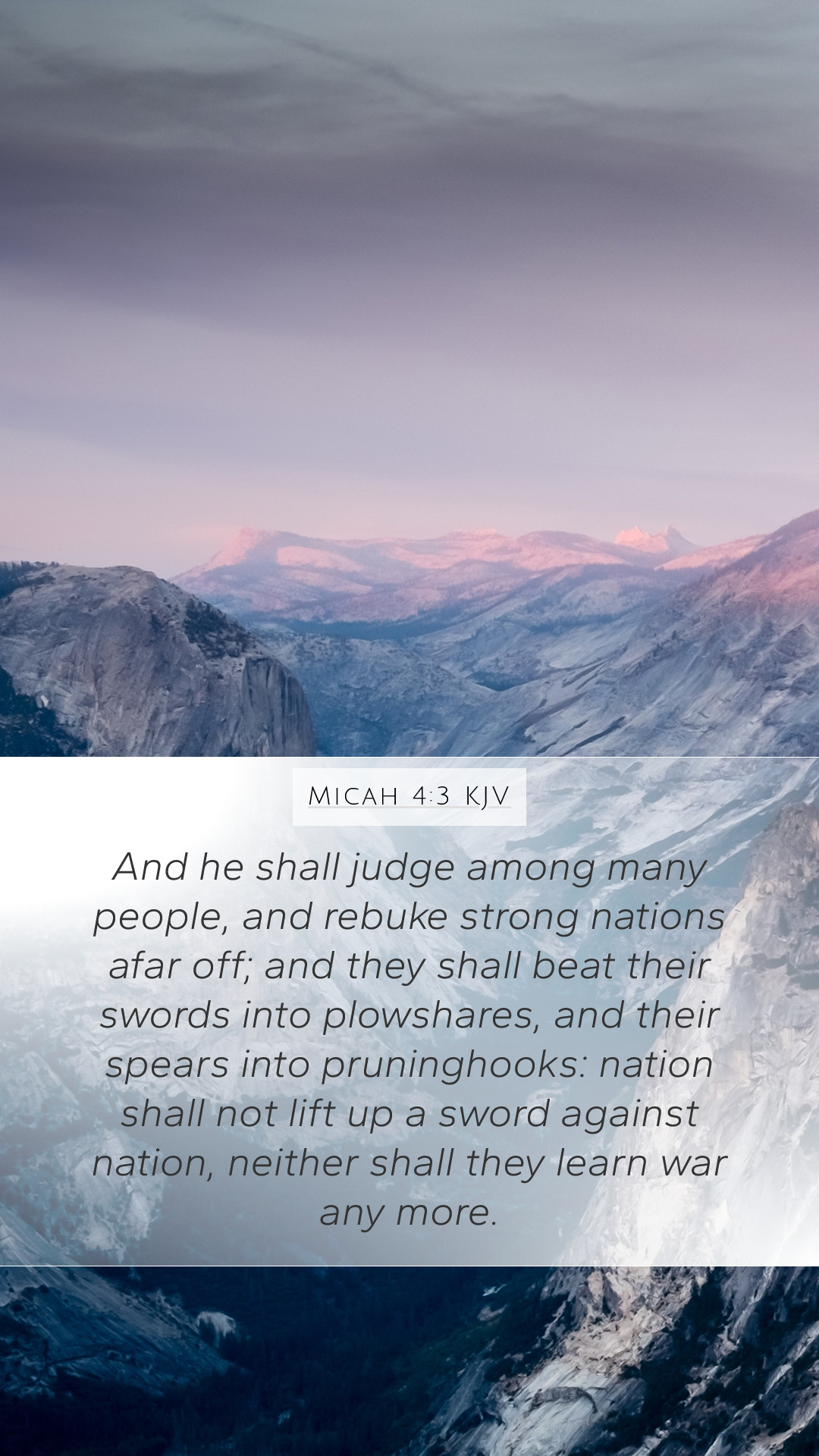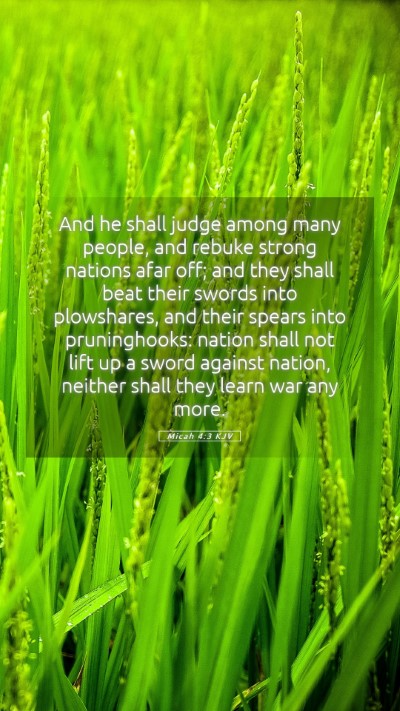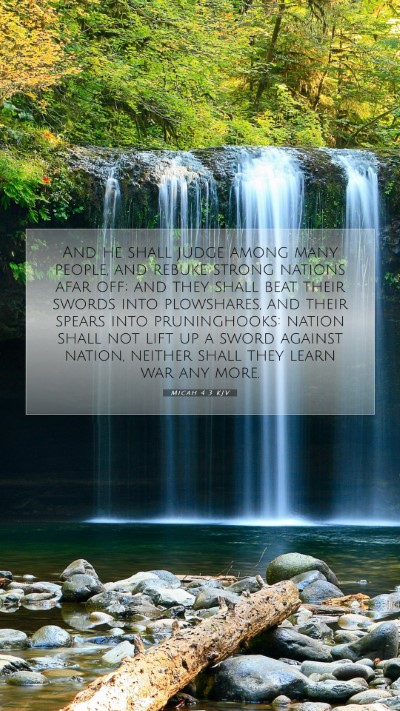Old Testament
Genesis Exodus Leviticus Numbers Deuteronomy Joshua Judges Ruth 1 Samuel 2 Samuel 1 Kings 2 Kings 1 Chronicles 2 Chronicles Ezra Nehemiah Esther Job Psalms Proverbs Ecclesiastes Song of Solomon Isaiah Jeremiah Lamentations Ezekiel Daniel Hosea Joel Amos Obadiah Jonah Micah Nahum Habakkuk Zephaniah Haggai Zechariah MalachiMicah 4:3 Meaning
What is the meaning of Micah 4:3?
And he shall judge among many people, and rebuke strong nations afar off; and they shall beat their swords into plowshares, and their spears into pruninghooks: nation shall not lift up a sword against nation, neither shall they learn war any more.
Micah 4:3 Bible Verse Meaning
Micah 4:3 - Meaning and Interpretation
Bible Verse: Micah 4:3 - "And he shall judge among many people, and rebuke strong nations afar off; and they shall beat their swords into plowshares, and their spears into pruning hooks: nation shall not lift up a sword against nation, neither shall they learn war anymore."
Overview of Micah 4:3
This verse from the Book of Micah speaks of a future time of peace and divine justice. It highlights the messianic hope where God will reign and establish His kingdom through judgment and reconciliation among nations.
Commentary Insights
The interpretations from various public domain commentaries add layers of understanding to this verse:
-
Matthew Henry:
Henry emphasizes the reign of Christ as the ultimate fulfillment of this prophecy. He sees the transformation of weapons into agricultural implements as a symbolic act of peace, indicating the cessation of hostilities and the establishment of a community founded on justice and righteousness. In Henry's view, this reflects the broader biblical theme of swords being turned into plowshares, embodying God's promise of peace.
-
Albert Barnes:
Barnes provides a historical context for Micah's message, noting that the verse articulates a time when God's law will be recognized and adhered to by all nations. He highlights the societal shift from warfare to agriculture, showcasing a universal recognition of peace. This commentary sheds light on the anticipation of the end of conflict and the establishment of a harmonious society under God's guidance.
-
Adam Clarke:
Clarke explores the implications of this verse in detailing the nature of God's judgment. He outlines how God's rule will correct injustices among nations, leading to a time where the principles of love and cooperation prevail over strife. Clarke argues that this verse points not only toward a future hope but also serves as a challenge for current societies to pursue peace actively.
Theological Implications
This verse speaks to the heart of Christian eschatology, capturing the essence of God's redemptive plan:
-
Judgment and Justice:
Micah 4:3 depicts God as a judge who brings justice to the nations, a reminder that divine authority will ultimately resolve all conflicts and injustices.
-
Hope for Peace:
The transformation of swords into plowshares powerfully symbolizes hope, indicating a future where peace reigns, and warfare is a thing of the past. This underscores the Christian hope for the return of Christ and the establishment of His eternal kingdom.
-
Universal Reconciliation:
The verse offers a vision of unity among nations, emphasizing that the principles of God's kingdom extend beyond Israel. This is a profound statement about the universal call to peace.
Application for Today
For modern readers, Micah 4:3 invites a reflection on how this prophetic vision can be applied in daily life:
-
Cultivating Peace:
Believers are called to model peace in their interactions, echoing the hope of this prophecy in their communities.
-
Advocating Justice:
Micah's message encourages followers to engage in social justice, working towards a world where God's justice prevails.
-
Promoting Unity:
This verse challenges Christians to foster reconciliation and understanding among diverse groups, reflecting God's vision for humanity.
Related Bible Cross References
- Isaiah 2:4 - "And he shall judge among the nations and shall rebuke many people: and they shall beat their swords into plowshares, and their spears into pruning hooks: nation shall not lift up a sword against nation, neither shall they learn war anymore."
- Revelation 21:4 - "And God shall wipe away all tears from their eyes; and there shall be no more death, neither sorrow, nor crying, neither shall there be any more pain: for the former things are passed away."
- Zechariah 9:10 - "And I will cut off the chariot from Ephraim, and the horse from Jerusalem, and the battle bow shall be cut off: and he shall speak peace unto the heathen: and his dominion shall be from sea even to sea, and from the river even to the ends of the earth."
Conclusion
Micah 4:3 stands as a powerful testament to the hope of peace and justice that is central to the biblical narrative. Its message resonates with those seeking understanding of Scripture, offering profound insights into the nature of God's kingdom and the call to embody His principles of peace in our lives. The synthesis of commentary from respected theologians enriches our understanding and application of this critical biblical prophecy.


